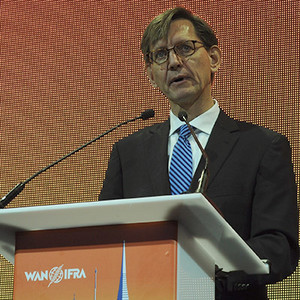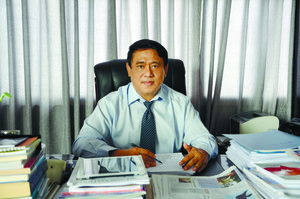Dr Than Htut Aung and his editorial staff have campaigned enthusiastically, with candour and boldness, for transparency and government accountability against the repressive political atmosphere since the media group was founded 13 years ago.
While he may describe Myanmar’s moves towards democracy in the past two years as “amazing”, Dr Aung warns that the process is now under threat. “If Myanmar goes backwards, it will be due to corruption,” he has said, reflecting a sense of uncertainty about the road to full democracy.
As a student of medicine, Than Htut Aung won a place at a university in England in 1988, but the military junta refused to issue him a passport. He spent a number of years in business before an opportunity to hire a publishing license led to the creation of the First Eleven Sports Journal.
The newspaper began with just three staff and an initial print run of 5,000 copies. As a weekly journal, it captured readers’ imaginations in a repressive, autocratic environment, with Dr Than and his writers cleverly crafting political messages into their football articles. “Man in the middle – the referee is ‘not fair'” was one headline. “Football is played not just among the 22 but all the audience” another, both analogies for parliamentary politics.
Readers young and old came to love this political overtone. Not unexpectedly, in 2003, Eleven Media’s offices were raided by military intelligence officers after the title ran a series of articles on a civilian massacre. Dr Than was briefly arrested. Also in 2003, one of its editors was sentenced to death over a story alleging misuse of an international grant. The sentence was later commuted to three years in prison.
Media censorship in the following year was intense. Eleven was portrayed as the “symbol of protest”. It soon boasted a staff of 50 and distribution grew to 12,000 copies. The reading public became more visibly interested in politically inspired football articles. Still unable to get a license to publish a daily, Dr Than launched its flagship news-weekly in 2005.
Official censorship prevailed with sports articles taking one to two days for approval, three to five days for other types of articles. “We had to be clever and careful,” Dr Than has said. “There are some good guys in the military intelligence service…some military intelligence officers are very intelligent.”
After 2005, the censorship situation improved somewhat with the responsibility transferred from the Interior Ministry to the Information Ministry. By that time, Eleven Media was publishing four days a week, four different titles (as private dailies were banned).
Following the election in 2010 after which a new government was installed under President General Thein Sein, Dr Than convinced the government to pursue a dialogue with the Opposition, including Aung San Suu Kyi, and to reach out to the international community.
In November 2010, the paper was banned from publishing for two weeks because of this sneaky sports headline that heralded Aung San Suu Kyi’s release from house arrest: the words “Su free, unite and advance to grab the hope” are hidden in a sports headline.
At Eleven Media Group’s 11th anniversary celebration in June 2011, Htut Aung tested the newfound freedom of Myanmar’s press by openly opposing the controversial Myitsone Dam project for being an environmentally disastrous undertaking by a government that assumed little accountability. He criticised the government, saying it wasn’t showing any serious consideration for the livelihood and welfare of the people, and questioned the country’s heavy dependence on China, noting that it posed an imminent threat because a weak Myanmar could not resist dominance by its giant neighbour.
The Myanmar government responded to the public’s growing restlessness over the project. It took the unprecedented step of announcing a temporary suspension of dam construction. Eleven Media journalists undertook a further investigation and reported that construction was still on-going in early 2012, despite the “stop” order. The exposé pressured the government to declare a permanent suspension.
In November 2011, at a reception to mark 11.11.11, Than Htut Aung took the bold steps of reserving seats for the imprisoned 88 Generation students group leaders and asking the government to free them all.
Today, as a market leader in Myanmar, Eleven employs 140 reporters and has a staff of over 450. It began publishing daily on 3 May 2013, appropriately, World Press Freedom Day, and also operates SMS mobile services and an English website.
Erik Bjerager’s Speech Awarding the Golden Pen of Freedom 2013
Golden Pen of Freedom 2013 Presentation Speech, delivered by Erik Bjerager, President, World Editors Forum at the Opening Ceremony, 65th World Newspaper Congress and 20th World Editors Forum, Bangkok, Thailand, 3 June 2013.

Your Excellencies, Ladies and Gentlemen,
By its very nature, our profession grants us the privilege to observe and report on the historic events that shape our world. Our ability to do so accurately and unhindered relies on the exercise of freedom, in all its forms. Such freedom is the foundation upon which the media is built and continues to thrive. For our colleagues in Myanmar, rediscovering freedoms after nearly 50 years of censorship and official control, the opportunity to shape their world a-new is in itself a historic moment. It is one that we loudly applaud.
In just a couple of short years, Myanmar has embarked upon an incredible transformation. From a closed authoritarian state crippled by international isolation, the country has today firmly set off down the road to democracy. Elections proposed for 2015 will, we hope, see that process come full circle.
Positive moves by the government to review the country’s existing laws, as well as a determination to pass new legislation that is better suited to a democratic society, are roundly encouraged.
For the media, the changes have been dramatic. They are testimony to the years of struggle endured by advocates for freedom. The reforms can be attributed to their determination never to give up.
Among the reforms include the removal of pre-publication censorship, a process that concluded in August of last year. Along with the reappearance in kiosks of private daily newspapers after an absence of 50 years, these are some of the encouraging signs indicating that the press breathes freely once more.
As an organisation, WAN-IFRA promotes press freedom and democracy in Myanmar and applauds the progress achieved so far. Yet the country is moving forward in what is set to be a long, complex process. While the speed of reform has been dramatic, the list of challenges remains lengthy.
Myanmar is building for the long-term, and the media has a vital role during the transition and beyond to lay firm ground for future generations.
One man who knows this more than most is our laureate, Dr. Than Htut Aung. Under his leadership, Eleven Media Group has prospered, despite the years of adversity. Building his newspapers from the ground up, he faced heavy government pressure and the ever-present censor’s pen. Nonetheless, he consistently defied restrictions on freedom of expression. Dr. Than stood up to the junta, and today, Eleven Media continues to broaden the boundaries of Myanmar’s newfound liberties. It began publishing its new daily on the 3rd of May, appropriately, World Press Freedom Day.
Since founding Eleven Media Group 13 years ago, Dr. Than and his editorial team have campaigned tirelessly for transparency and government accountability in Myanmar. An enthusiastic supporter of the reforms that are sweeping his country, he nevertheless maintains a cautious optimism. As we have come to expect, the critical eye of his newspaper group remains honed on the challenges ahead.
The First Eleven Sports Journal appeared in the year 2000 as a weekly title with a staff of just three and an initial print run of only 5,000 copies.
Capturing readers’ imaginations in an increasingly repressive, autocratic environment, Dr. Than and his writers seized the opportunity to cleverly craft political messages into their football stories – articles less likely to be dissected by the censors.
“Man in the middle – the referee is ‘not fair,’” was one headline, and another, “Football is played not just among the 22 but all the audience”: both were analogies for politics in Myanmar.
In one of their boldest, most recognised exploits, in November 2011, sales of Dr. Than’s newspapers were suspended for two weeks after it reacted to Aung San Suu Kyi’s release from house arrest. A front-page headline appeared in which some letters were printed in a lighter shade to spell out: “SU FREE. UNITE & ADVANCE TO GRAB THE HOPE.”
Early popularity meant that by 2005 Eleven Media was publishing four days a week under four different titles. The launch of Weekly Eleven News Journal meant its coverage grew to include news, business, lifestyle and opinion pieces and, of course, intently read sports articles. Dr. Than’s principled defiance, courage and determination to use his media group as a force for change meant that his newspapers became a “symbol of protest” during a period in which military intelligence raided its offices, and death sentences and prison terms were levied against its editors. Dr. Than was himself briefly arrested in 2003.
Myanmar was once home to a vibrant printing culture, with daily newspapers in Burmese, English, Chinese and Indian languages flourishing. Before the 1962 coup d’état that brought the military to power, the country’s press was one of the freest in Asia. The junta replaced this fine legacy with a culture of censorship, harassment and arrest. Private daily printing was shut down. Democracy could not be spoken of. Describing natural disasters became taboo, even defeat for national sports teams off limits.
We applaud the return of the unfettered printed word and acknowledge the debt owed to Dr. Than and others, who kept press freedom and democratic hope alive in Myanmar.
Men and women like fellow Golden Pen of Freedom laureates from Myanmar, U Win Tin, San San Nweh and U Sein Win, who continued to pursue a critical editorial line throughout this time of darkness, risking censorship, jail, torture, or worse.
As a measure of just how determined the military regime was in stifling freedom of expression, WAN-IFRA delivered the 2001 Golden Pen to U Win Tin and San San Nweh only last week during a visit to Myanmar. Twelve years after making the award, at a time when both journalists were imprisoned, their recognition, finally, is a sign for hope for lasting change.
The Pen recognised that they would not be cowed, their struggle could not be defeated, and their belief in freedom would be overcome. It is for the people of Myanmar, with the media as watchdogs over their freedom, to direct the course of history now.
It is fitting, 50 years after the award of only the second-ever Golden Pen to veteran journalist, U Sein Win, that we celebrate a laureate from Myanmar once more. A generation separates the two men, yet common beliefs unite them: a desire for freedom, and the courage to go out into the world and seek it.
Ladies and gentlemen, I would now like to call Dr. Than Htut Aung to come forward to accept the 2013 Golden Pen of Freedom.


